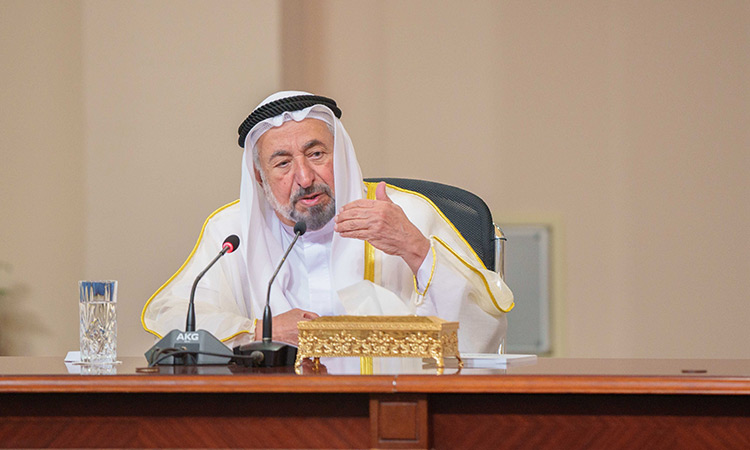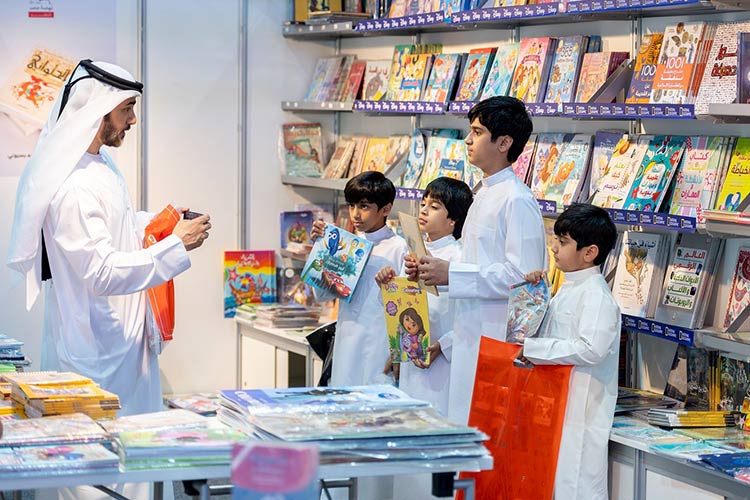Sultan reviews manuscripts at Madrid’s El Escorial library

Sheikh Sultan visits several museums, monasteries and other historical buildings in Madrid, Spain, on Thursday.
Once the historical residence of the King of Spain and known to house one of most extensive libraries in the world, the El Escorial houses a rare collection of more than 45,000 articles including books, maps, manuscripts, coins, sculptures, and drawings. Of particular interest are the volumes on philosophy, poetry and politics in Latin, Greek, Italian, Spanish, Portuguese, English, Arabic, Persian and other languages, many of which date back to the 15th and 16th centuries.
The Sharjah Ruler also visited the main hall which houses geographical prototypes, volumes and books in all sciences and languages, and was briefed on the library’s unique book classification system and maintenance mechanisms.
His Highness Dr Sheikh Sultan then visited the library’s rare manuscripts department to review a collection of manuscripts in history, geography, sciences, linguistics, in addition to a collection of manuscripts in Arabic, atlases in Latin and maps of the Arabian Gulf which date back to the 12th, 13th and 14th centuries.
His Highness also reviewed some of the important manuscripts by Arab scholars, such as Ibn Khaldun, a scholar from the 14th century; Ibn Al Wardi, a historian from the 14th century; Mohammed Bin Dhafer from the 12th century; and the Book on the Usefulness of Animals by Ibn Al Durayhim, a 14th century scholar.
Sheikh Sultan has expressed his happiness and pride for receiving an honorary doctorate from the prestigious academic institution of Universidad Autónoma de Madrid (Autonomous University of Madrid).
The Sharjah Ruler delivered an inspiring acceptance speech at the honouring ceremony held by the university in recognition of His Highness’s cultural efforts, in the presence of the university’s rector, deans as well as academics and political figures.
His Highness the Ruler of Sharjah said: “I am delighted to be here and pleased to meet a large group of distinguished academics, researchers and guests from universities, government and private institutions. We extend our sincere thanks and appreciation to the professors of the Biology department, committee members of honorary degrees, the rector and board of trustees. We are grateful for this honour and will cherish it for life.”
“Some of you may know that I have been reading history and writing about it for a long time, History runs in my blood — I will not stop continuing my work in the field. I have studied many periods in Spain’s history. When I met with Professor Arturo Morales-Muñiz accompanied by the Spanish Ambassador to the UAE, he wished that my speech would contain an Arabic poem.”
His Highness Dr Sheikh Sultan Al Qasimi recited a poem he authored for the occasion.
“As for the present and the future, Sharjah and Spain enjoy a longstanding cultural, academic and humanitarian relationship. One of the most important aspects of this relationship is cooperation in the field of archaeological excavations. In 1996, a Spanish archaeological excavation mission from the Autonomous University of Madrid began its first season of work in the central region of Sharjah, led by Professor Dr Joaquin Cordoba Zuelo in partnership with Sharjah Archaeology Authority. The results of the excavation so far confirm our belief in the archaeological significance of this region.”
“We would like to point out that the Spanish mission unearthed an important and unprecedented discovery during the 2002 excavation season. They found an ancient underground canal irrigation system designed using a sophisticated technique of the Iron Age. Researchers believe that the unearthed system is the oldest discovered so far. This system in conjunction with camel domestication completely revolutionised the transportation of goods in the region; and helped inhabitants adapt better to the harsh desert environment. The mission discovered evidence of a clay brick processing plant, which was used to build permanent residences in the farming communities of the region.”







